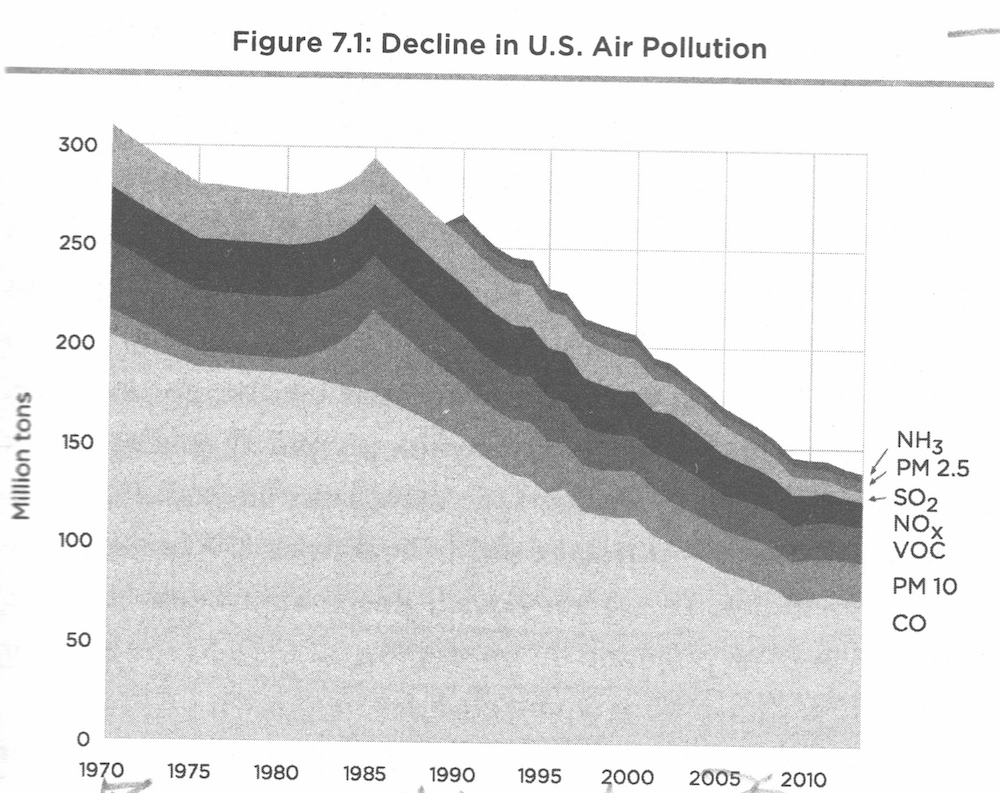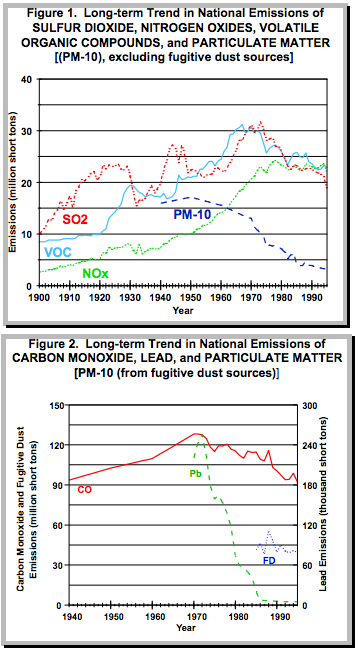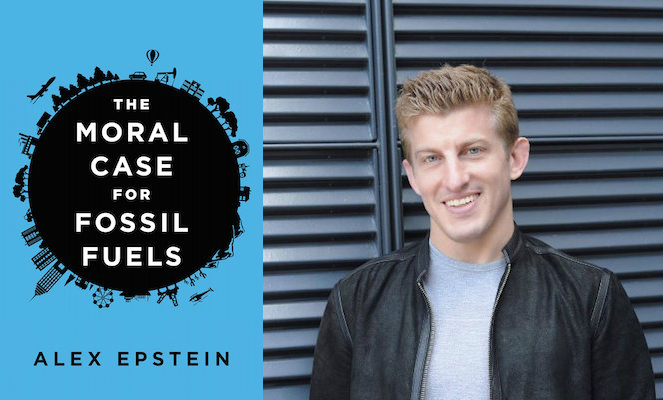In the 17th century, new facts about the world presented a problem for natural philosophers. They had learned of droves of new animals from the New World, previously unknown in Europe, that must have survived the Great Flood. This begged the question: how did Noah’s Ark fit all of them? Several thinkers made honest attempts to resolve the issue, including sketching increasingly preposterous schematics of the ship itself, in addition to devising clever, logic-twisting tricks of taxonomy — based on no evidence whatsoever — that “explained” the ability of the Ark to do as was written. Even in their own time, it was easy to see the cracks forming in the story. But it should not be at all surprising that learned men clung so desperately to their frame of knowledge and history, wanting everything they knew as true to remain so.

We are facing a similar problem when it comes to climate change and environmental catastrophe. Our political discourse cannot disenthrall itself of the trinity of the all-knowing Market, the idea of The Economy, and the promise of unlimited growth without consequence. Some even devise half-brained arguments which already appear completely absurd, if not outright dishonest. The political right seems to have a virtual monopoly on the latter.
Alex Epstein’s The Moral Case for Fossil Fuels, which earned a spot on the New York Times Bestseller list and was received with hugs and smooches in the right wing press upon its release in 2014, was called “utterly terrific” by The National Review. They went on to say that its overall argument was “powerful, systematic, and relentlessly logical.” Epstein describes himself as a philosopher with a rational view of these issues, and like other prominent hip young right wing thinkers of today — including aspiring Fourth Reicher Richard Spencer and resident White House Ghoul Stephen Miller — he cut his teeth debating at Duke University. A current resident scholar at Cato Institute, he was previously a fellow at the Ayn Rand Institute and went on to found a think tank, the Center for Industrial Progress, that promotes the increased use of fossil fuels across the globe.
Let’s be frank: this book is targeted at the gerontocracy of the Boomer Paranoia Industrial Complex, written in a tone designed to appeal to the Ailes-Addled set while reassuring the generation that has known nothing but growth and prosperity that the good times can roll on in perpetuity without consequence. To accomplish this, Epstein employs a matter-of-fact tone about non-facts, and a keyword laden, proto-Trumpian style (fossil fuels exist in “astonishingly, astonishingly large quantities”; the idea that we are “very, very good at using technology”; and, my personal favorite, “once human beings came on the scene with their fantastic brains…”).
Epstein’s primary argument is that fossil fuels (and by association the fossil fuel industry) have been so beneficial to civilization that we should dramatically increase, not decrease, their use globally. He presents as revelation an anodyne fact of world history that should be familiar to any 12th grader: that the period of fossil fuel discovery and use has coincided with the greatest increase in the standard of living in human history. This becomes the basis for his definition of morality — a “human standard of value” that “will promote human flourishing.”
What follows is a dense flow of equivocation, obscured facts, bad history, and outright falsehoods. To Epstein, the natural world is a vicious place, inherently hostile to human life. Only our high energy society and its technologies have created livable world from it. One might consider how humans managed to populate every habitable part of the planet thousands of years before the first pickaxe struck an anthracite seam. Or how agriculture and animal domestication gave us diseases and poverty which plague us the world over. Ignoring this, Epstein spends a good share of his word count correlating increased fossil fuel use throughout history with many improvements in the standard of living: declining infant mortality, increased life expectancy, better access to clean water, increased GDP per capita, and the discovery of treatments for diseases like tuberculosis. For this, he says, “we owe the fossil fuel industry an apology.”
All is not as it seems. For example, Epstein relies upon EPA emissions data that show levels of air pollutants declining precipitously from 1970 to the early 2010s. He argues that increased fossil fuel use over the same period went hand in hand with cleaner air, that new technologies themselves created using fossil fuel energy helped improve the environment rather than harm it. A curious reader might wonder: why 1970? The answer, of course, is that the EPA itself was founded in 1970 and began keeping this particular dataset in that year. As for before 1970? Epstein is silent. In a 1996 paper released by the EPA, air pollutant emission trends are charted from 1900-1995. Here is a comparison of the two charts.


Notice anything particular? Prior to key environmental legislation in the ‘60s and ‘70s, there is a dramatic increase in all manner of air pollutants. Epstein credits the beneficial results of regulation to the very industry whose practices had to be regulated in the first place. This is dishonesty by omission, an obvious con that even a Nigerian prince would drag to the spam folder. Instead, Epstein uses this case to argue that the fossil fuel industry can create new technological solutions to curb its own polluting, but fails to say what would motivate them to do so.
Epstein calls life expectancy one of the best indicators of “human flourishing.” By that measure, the regulation of fossil fuels in the United States via Clean Air Acts and the establishment of the EPA actually improved the standard of living. In his tome The Rise and Fall of American Growth, which traces the history of the American standard of living, economic historian Robert J. Gordon points to recent studies that indicate the reductions in air pollution resulting from these acts “had substantial effects on life expectancy…accounting for about 15% of the 2.7 year increase in life expectancy” from the period 1980-2000.
Gordon’s work also posits that most of the innovations that dramatically increased the standard of living in the US have already happened and could only come around once, such as the networking of houses with plumbing and electricity and curing the most dangerous childhood pathogens. In fact, we are seeing a decline in standard of living in key areas in the United States: American life expectancy appears to be declining for the first time in 25 years; America has only the 59th-lowest infant mortality rate, sandwiched between Serbia and Bosnia; and when it comes to access to clean drinking water, the people of Flint Michigan might care to have a word. All of this has happened as Americans use the most energy of any people on the planet. Europeans have better outcomes in this regard, all while consuming per capita half as much energy as Americans. The “flourishing” benefits of fossil fuel use seem to have diminishing returns in rich countries.
Epstein calls for increases in fossil fuel use to improve conditions in poorer countries — a fair point — but says nothing about energy use in the rich world. He stresses that the predictions of environmentalists in the 1960s and ‘70s forecast extreme ecological catastrophe in our present decade — as if standards and regulations weren’t adopted in the meantime — and argues the regulations proposed in the 1970s “were wrong because of all the death and suffering they would have inflicted on human beings.” Of course, he’s not specific on what those “regulations” were, other than to quote some of the more extreme statements of certain environmentalists.
Part of the reason he’s able to block out these troubling facts while ignoring the benefits of regulation is because he relies upon a complete lack of understanding of ecology and a silly caricature of who environmentalists are.
Ecology is a science of inputs, outputs, and flows of energy in environmental systems. These systems can innately handle a certain amount of pollution. But, much like a liver bombarded with too much alcohol all at once, they are unable to handle a large amount in a small period of time. This is precisely what environmentalists and ecologists mean when they talk about problems from ocean pollution to climate change: that the amount and rate are overwhelming the ability of natural systems to filter them out. Mainstream environmentalists are people who urge caution based on this study of ecology.
But this is not how Epstein describes them. Instead, they operate with a “non-human standard of value.” By citing repeatedly only several figures — in particular Paul Ehrlich and Bill McKibben — he is able to draw a cartoonishly evil depiction of the entire movement. When leaders call for vast reductions in fossil fuel use and a switch to renewables, he argues, they are consequently calling for increased misery and suffering around the world. Furthermore, the morality of environmentalists is based on “non impact” to the environment with the goal of preserving the natural world for its own sake, regardless of the impact on mankind — an extraordinary claim he makes without much evidence. Doubling down, he writes: “I’m saying that if fossil fuels created no waste, including CO2, if they were even cheaper, if they would last practically forever, if there were no resource depletion concerns, the green movement would still oppose them.”
This is precisely the kind of rhetoric that enables the right wing to create boogeymen of anyone arguing for environmental sustainability, while imparting onto these invented monsters a motive for falsely creating a narrative about the perils of global warming. It should come as no surprise that Epstein doesn’t think climate change is a problem at all, a fact very convenient for his overall argument. In order to demonstrate this, he cites the inadequacy of previous climate models and the very science of CO2 greenhouse warming, among other garden variety denier talking points. Apparently while collectively apologizing to the industry we should also ignore how ExxonMobil hid its own research on climate change from the public, choosing instead to fund campaigns of misinformation. Harvard Professor Jody Freeman so thoroughly destroyed his examination of the science of climate change in a 2015 Energy Law Journal review that it took two full years for Epstein to come up with a rebuttal.
What about renewable energy? Epstein spends a large part of his time demonstrating how energy sources like wind and solar generate an extremely minor share of the world’s current energy output. He repeats as mantra the features of fossil fuels that other sources lack: “cheap, plentiful, reliable.” This is perhaps the only coherent and valid argument he makes throughout his book. But it’s one made with more skill and evidence by Vaclav Smil, Professor of Environment at the University of Manitoba and prolific energy scholar, who in Energy and Civilization and Energy Transitions shows that the transition from one form of energy to another is always a tedious process. The switch from fossil fuels to renewables will be no different. Part of the reason, Smil says, is that new forms of energy are reliant upon the infrastructure of the current regime — and the fossil fuel industry has created the most complex, global infrastructure in history. In the United States this infrastructure is, at present, far from being prepared for a large switch to renewables.
But claims about current output say nothing about the future. Epstein says that renewables can never replace fossil fuels in any great amount. He expects us to rely upon technological optimism when it comes to the fossil fuel industry creating new ways to deal with its own pollution, but for some reason cannot extend the same courtesy to advances in renewable forms of energy.
Epstein takes this a step further, pointing out that the production of renewables like wind and solar would require the use and extraction of rare earth metals that are highly toxic. While the latter point is true, he cannot have it both ways. If fossil fuels are given credit for every tangential technological invention and advancement that benefits society, they must also take the blame for a world filled to the brim with the useless cruft of the global consumer economy that it helped create. This includes under-desk elliptical machines, electric can openers, individually plastic-wrapped toys, and all of the cheap, useless trinkets available in bulk from the Oriental Trading catalog. Fossil fuels gave us the globalized world of rapid shipping and travel, which includes outsourcing labor to cheaper nations and the kind of convenient consumption that has left us with a giant island of refuse currently swirling in the Pacific. Our high energy civilization isn’t high energy only because we have higher living standards. It’s high energy because we consume relentlessly under the assumption that we can do so forever.
This a relatively recent way to think about the world. Timothy Mitchell’s Carbon Democracy shows how the development of the oil industry went hand in hand with a novel conception of economics: “The word ‘economy’ existed prior to the 1930s, but it referred to a process, not a thing. It means government, or the proper management of people and resources, as in the phrase ‘political economy.’” This new object called the economy was “the self-contained structure or totality of relations of production, distribution, and consumption of goods and services within a given geographic space.” It became a thing to be served above all others in the process of democratic governance.
Mitchell goes on to describe a debate among early 20th century economists about how this economy should be described: as the study of “natural resources and flows of energy” or “the study of prices and flows of money.” The latter group won out. From that movement the later neoliberal establishment was born, along with the idea that growth could be infinite — an idea that was unlikely prior to the 20th century. That way of thinking centered on the concept of “the market,” one that dominates our current era. The most important point about “the market” is that it cannot account for environmental damages and the overdrawing of natural resources. Economists even have an academic term for this: externalities. It’s clear that Epstein doesn’t know how to account for them either, considering he discusses the price system as a method for picking a source of energy production, but not the unpriceable effects of that production in the form of environmental degradation. The earliest neoliberal thinkers would have agreed with Epstein’s line, arguing that technological innovation would resolve environmental problems.
This recent conception of economics is a limit to our collective imagination when it comes to solving problems. Our technocratic leaders are more likely to piously ask how the market would react to a given policy than they are to ask how people or even the environment would. Within this priesthood Epstein is a clergyman, openly describing himself as a “young free marketer” and quoting Ayn Rand at length. He believes that effective regulation also needs to ensure a “right to pursue a modern, industrial life with all the energy that life requires,” even though current economic thinking does not allow us to see precisely what “all the energy that life requires” would be.
Contemporary debates about climate change mostly operate within this limited framework, bickering which form of technological optimism should guide us. On the right, you have the Epsteins who claim that the status quo can go on forever because the market is a wise deity who lovingly bestows on us the ability to invent our way out of any peril. The institutions of the faith, like the fossil fuel industry, need to be given appropriate praise. Sure, your father is a gambling-addicted drunk who tears up the back yard and raids your college fund, but puts food on the table, doesn’t he?
But the left doesn’t get off easy. Overpromising on the job-creating, economy boosting utopia of a rapid switch to renewables is, as Smil has shown, beyond optimistic. It will take a great deal of investment in research and development to get us even part of the way there — investment that even the politicians on the left are unwilling to make.
This brings us back to the 17th century and the Great Flood. All around us is new evidence that the natural resources of the world are not infinitely exploitable at the current scale; that the ecological systems of Earth cannot sustain the high energy society based on ever-increasing consumption. Yet the solutions we hear from all sides are akin to debates about the size and dimensions of the Ark: we refuse to admit to ourselves that it is not only impossible, but that the tale has outlived its historical and social usefulness. Neither side says much about a concerted, large effort to reduce consumption. After all, how would the market react?


